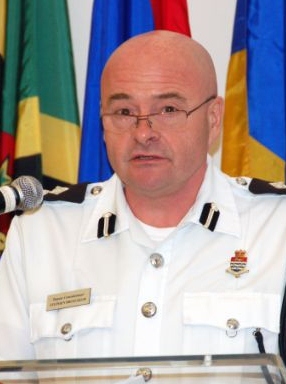Small nations challenged in crime fight
 (CNS): Deputy Commissioner of Police Stephen Brougham said some of the challenges of forensic evidence gathering for small Caribbean nations included cross-contamination when evidence is sent overseas. Speaking at the first meeting of regional public prosecutors in Cayman last week, the senior cop said that some serious cases had been lost in Cayman’s courts recently when gunshot residue and DNA evidence was thrown because of the potential of contamination. Even in relatively simple cases, Brougham said, evidence might have to be shipped to three to four different laboratories and experts, introducing added problems for law enforcement officials.
(CNS): Deputy Commissioner of Police Stephen Brougham said some of the challenges of forensic evidence gathering for small Caribbean nations included cross-contamination when evidence is sent overseas. Speaking at the first meeting of regional public prosecutors in Cayman last week, the senior cop said that some serious cases had been lost in Cayman’s courts recently when gunshot residue and DNA evidence was thrown because of the potential of contamination. Even in relatively simple cases, Brougham said, evidence might have to be shipped to three to four different laboratories and experts, introducing added problems for law enforcement officials.
The issue of the need for more reliable forensic evidence in order to secure convictions for serious crime was one of the main issued highlighted at last week’s newly formed Caribbean Association of Prosecutors two-day workshop, which was designed to provide insights into forensic science and trans-national crimes. Twelve experts from the UK, Canada and the Eastern Caribbean provided the training to take forward the workshop’s theme: 'Enhancing the Effectiveness of Prosecutors in a Challenging Environment'.
There were 63 participants from some 19 territories and countries from the region. Speakers at the opening ceremony highlighted the need for more reliance on non-eyewitness evidence for use in court cases because of increasing reluctance of witnesses to come forward and the threats to those who do.
Governor Duncan Taylor said the challenge of serious crime that Caribbean countries face is compounded by the economy of scale in small nations which limits forensic growth, as he welcomed the association taking a collaborative approach to improving effectiveness in fighting and prosecuting crime.
Cayman’s Director of Public Prosecutions, Cheryll Richards, said this new association provided members with continuing education opportunities to better perform their jobs.
Cayman’s hosting of the first such workshop was the outcome of joint collaboration of the Eastern Ontario Regional Forensic Pathology Unit, the Commonwealth Secretariat and the OTD Criminal Justice Office of the British Consulate-General in Miami.
Category: Crime


Based on what I've heard the RCIPS is stuck in a situation where even basic forensics (like GSR, which is a roadside test in most major countries) have to be farmed out to labs outside the Cayman Islands. In this situation the chain of evidence is almost impossible to maintain.
DCoP Brougham could just as correctly have observed that law enforcement agencies in small island communities needed to sort out their financial priorities and not throw large amount of money away buying things like Dodge Chargers and CCTV systems that don't work while not actually addressing the assets they need to deal with real crime issues.
Back in 2007 the previousCoP, Stuart Kernohan, had plans for Grand Cayman crime lab – anyone know what happened to that?
Utter nonsense and baloney!
It is your incompetent local crosscontamination causing the pervertion of the course of justice!
Owen up to it. The experts are overseas, not you!
How dare you make such a false statement in attempt to brainwash us all .
Excuses, excuses, excuses!
Sounds like a load of shifty cobblers to me. Don't bother knocking on my door for your DNA sample.
The failure in Cayman's justice system to deliver comfort to the stakeholders has proven that it is not the integrity of the forensics, but rather the integrity of the oversight that must be brought into question.
If you continue to play catch, contaminate and release, one day people will figure you out. I may remind us all that we are not above the law regardless of our position in society, but we should serve one another to the best of our ability.
This type of mindset would soon give criminals little refuge wherever they may be residing, be it in the abandoned crack-houses or the upper echelons of law-enforcement.
Sadly, there's a heck of a lot of truth in your comments.
A major crime scene has to be sealed off while forsensic investigations take place and, based on my first hand experience, that doesn't happen much in the Cayman Islands.
If there is a major incident it's no use letting letting everyone and their cousins rubber-neck the site, go talk to friends and relatives who are RCIPS officers or whatever. I can't remember specifically which West Bay murder it was but by the time the Cayman equivalent of CSI turned up it looked like half the neighbourhood had trampled over the scene trying to get a look at the body.
The other problem seems to be that RCIPS can't even conduct meaningful door-to-door enquiries. If you don't get a reply you should either slip a note under the door or go back later – better still do both. What you don't do (as happened in more than one recent case) is just forget all about it.